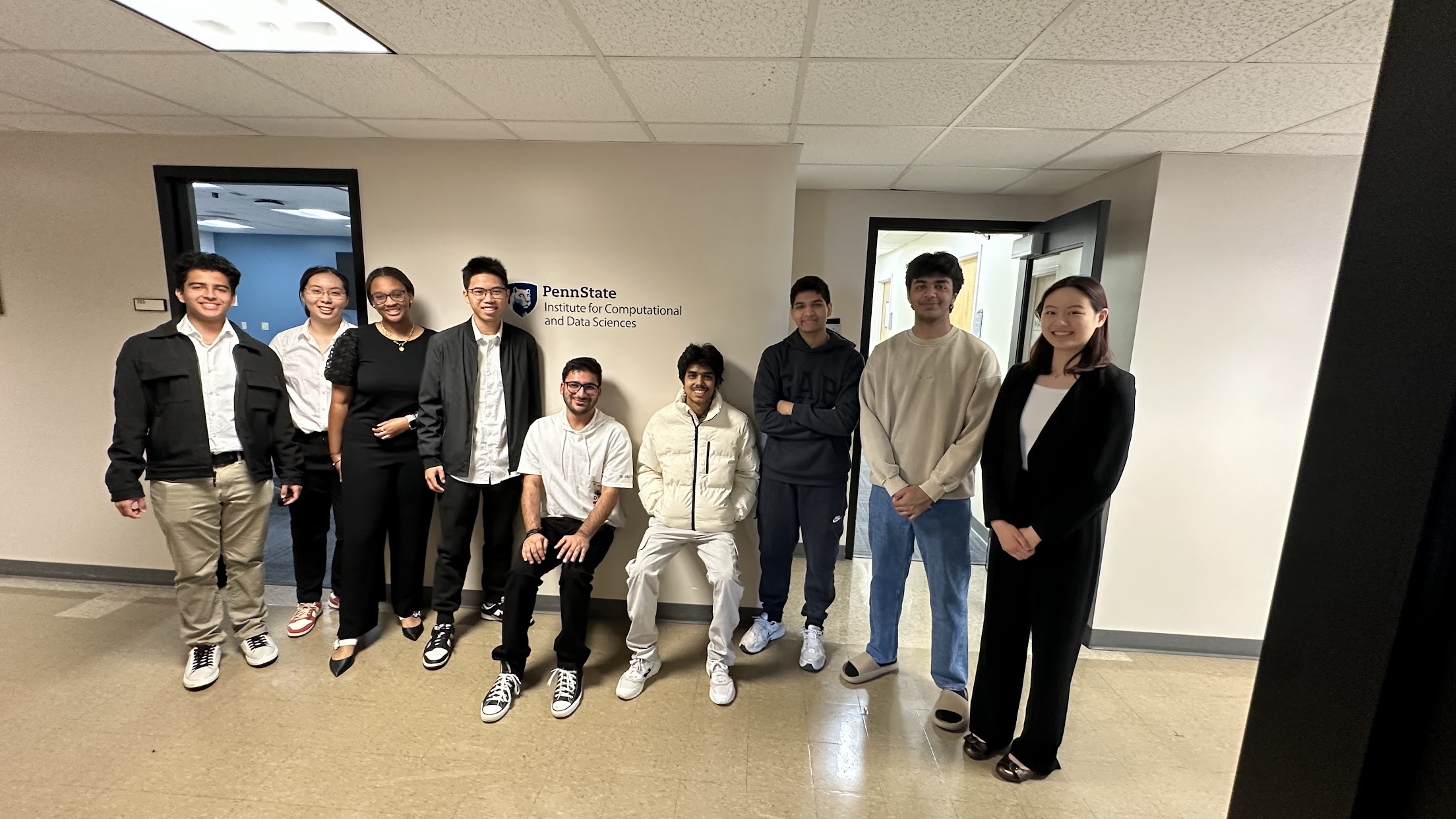
Students from the RAGatha and Zoodo HackPSU ICDS challenge pose for a photo after a recent visit. Credit: Todd Price/ICDS
Penn State students shine at HackPSU with innovative chatbot solutions for ICDS
Posted on November 18, 2024Two teams of Penn State students recently showcased their technical skills by developing real-time chatbots for the Penn State Institute for Computational and Data Sciences (ICDS) at HackPSU on Oct. 12 and 13.
The teams, in the ICDS challenge, were tasked with creating a retrieval-augmented generation (RAG) chatbot capable of answering client questions based on the ICDS user guide.
“As freshmen in computer science, building Zoodu for HackPSU was an exciting challenge,” said Tejas Singhal, freshman computer engineering student, of Delhi, India. “We designed the chatbot using retrieval-augmented generation (RAG) techniques to create a more interactive and resourceful tool, blending real-time data and natural language processing. This experience allowed us to not only apply our learning but also explore how AI can provide practical solutions in real-world contexts.”
The chatbots were evaluated on their performance in a 10-question quiz administered by ICDS staff. The scoring also included user experience (UX) and design principles such as speed of loading and graphical user interface (GUI) layout.
“We utilized Langchain to manage data from the user guide by loading, splitting, and retrieval-augmented-question-answering processing in OpenAI LLM,” said Chaoping Li, freshman computer engineering student.
Out of seven other submissions, both the RAGatha and Zoodu teams created intuitive and efficient chatbots, demonstrating their ability to integrate complex technical knowledge with user-friendly design.
“We learned a lot about RAGs, Python, creating user interfaces. It was a great learning experience which supplements what we learn in classes at Penn State as engineering majors,” said Tina Zhang, freshman electrical engineering student.
To celebrate their work, the students from both teams demonstrated their tools to the ICDS engineering team and discussed AI and large language models in the field of high-performance computing.
“I am very proud of our team and the product we came up with. Each challenge we faced during HackPSU brought us invaluable experience that will prove to be useful for many future endeavors,” said Ayden Alex, freshman computer engineering student.
Aryan Sabnekar, freshman computer science student, agreed with that sentiment.
“Building and testing our RAGatha chatbot taught us a lot about teamwork and problem-solving. Every time we fixed a bug or added a new feature, it felt like we were getting closer to something really amazing. It was hard work, but it’s one of the best things I’ve done in school so far,” Sabnekar said.
The RAGatha team included Ayden Alex, freshman computer engineering student; Leona Chen, freshman computer science student; Chaoping Li; Aryan Sabnekar, freshman computer science student; and Tina Zhang, freshman electrical engineering student.
The Zoodo team included four international freshman computer engineering students Tejas Singhal, of Delhi, India; Devank Yadav, of Gurgaon, India; Rishi Raj, of Dubai, UAE; and Rajveer Singh, of Dubai, UAE.
“This was everyone in our team’s first ever hackathon experience. To say the least, it was a phenomenal experience, and we are proud to have learned a lot and created a working program within a single weekend,” Chen said.
Share
Related Posts
- Professor receives NSF grant to model cell disorder in heart
- Featured Researcher: Nick Tusay
- Multi-institutional team to use AI to evaluate social, behavioral science claims
- NSF invests in cyberinfrastructure institute to harness cosmic data
- Center for Immersive Experiences set to debut, serving researchers and students
- Distant Suns, Distant Worlds
- CyberScience Seminar: Researcher to discuss how AI can help people avoid adverse drug interactions
- AI could offer warnings about serious side effects of drug-drug interactions
- Taking RTKI drugs during radiotherapy may not aid survival, worsens side effects
- Cost-effective cloud research computing options now available for researchers
- Costs of natural disasters are increasing at the high end
- Model helps choose wind farm locations, predicts output
- Virus may jump species through ‘rock-and-roll’ motion with receptors
- Researchers seek to revolutionize catalyst design with machine learning
- Resilient Resumes team places third in Nittany AI Challenge
- ‘AI in Action’: Machine learning may help scientists explore deep sleep
- Clickbait Secrets Exposed! Humans and AI team up to improve clickbait detection
- Focusing computational power for more accurate, efficient weather forecasts
- How many Earth-like planets are around sun-like stars?
- SMH! Brains trained on e-devices may struggle to understand scientific info
- Whole genome sequencing may help officials get a handle on disease outbreaks
- New tool could reduce security analysts’ workloads by automating data triage
- Careful analysis of volcano’s plumbing system may give tips on pending eruptions
- Reducing farm greenhouse gas emissions may plant the seed for a cooler planet
- Using artificial intelligence to detect discrimination
- Four ways scholars say we can cut the chances of nasty satellite data surprises
- Game theory shows why stigmatization may not make sense in modern society
- Older adults can serve communities as engines of everyday innovation
- Pig-Pen effect: Mixing skin oil and ozone can produce a personal pollution cloud
- Researchers find genes that could help create more resilient chickens
- Despite dire predictions, levels of social support remain steady in the U.S.
- For many, friends and family, not doctors, serve as a gateway to opioid misuse
- New algorithm may help people store more pictures, share videos faster
- Head named for Ken and Mary Alice Lindquist Department of Nuclear Engineering
- Scientific evidence boosts action for activists, decreases action for scientists
- People explore options, then selectively represent good options to make difficult decisions
- Map reveals that lynching extended far beyond the deep South
- Gravitational forces in protoplanetary disks push super-Earths close to stars
- Supercomputer cluster donation helps turn high school class into climate science research lab
- Believing machines can out-do people may fuel acceptance of self-driving cars
- People more likely to trust machines than humans with their private info
- IBM donates system to Penn State to advance AI research
- ICS Seed Grants to power projects that use AI, machine learning for common good
- Penn State Berks team advances to MVP Phase of Nittany AI Challenge
- Creepy computers or people partners? Working to make AI that enhances humanity
- Sky is clearing for using AI to probe weather variability
- ‘AI will see you now’: Panel to discuss the AI revolution in health and medicine
- Privacy law scholars must address potential for nasty satellite data surprises
- Researchers take aim at hackers trying to attack high-value AI models
- Girls, economically disadvantaged less likely to get parental urging to study computers
- Seed grants awarded to projects using Twitter data
- Researchers find features that shape mechanical force during protein synthesis
- A peek at living room decor suggests how decorations vary around the world
- Interactive websites may cause antismoking messages to backfire
- Changing how government assesses risk may ease fallout from extreme financial events
- Penn State’s Leadership in AI Research
- Symposium at U.S. Capitol seeks solutions to election security
- Using social media to solve social problems- study funded by ICS seed grant

